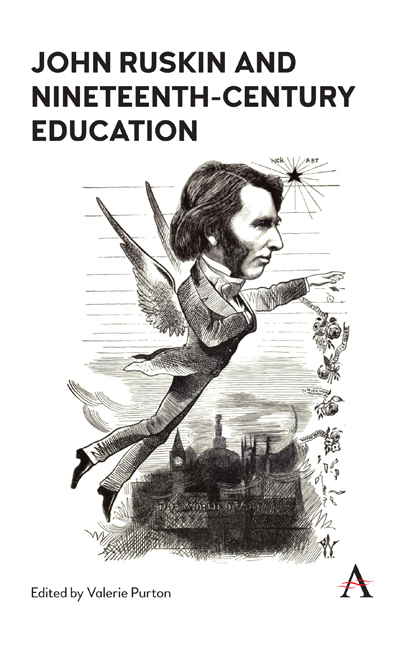Book contents
- Frontmatter
- Contents
- List of Figures
- Foreword
- Introduction
- Section A Changing the World
- Section B Libraries and the Arts
- Chapter 5 ‘A Very Precious Book’: Ruskin's Exegesis of the Psalms in Rock Honeycomb and Fors Clavigera
- Chapter 6 ‘Our Household Catalogue of Reference’: Ruskin's Lesson Photographs of 1875-76
- Chapter 7 Ruskin, Music and the Health of the Nation
- Chapter 8 Ruskin and the Fantastic
- Section C Christianity and Apocalypse
- Notes on Contributors
- Index
Chapter 7 - Ruskin, Music and the Health of the Nation
from Section B - Libraries and the Arts
Published online by Cambridge University Press: 25 July 2018
- Frontmatter
- Contents
- List of Figures
- Foreword
- Introduction
- Section A Changing the World
- Section B Libraries and the Arts
- Chapter 5 ‘A Very Precious Book’: Ruskin's Exegesis of the Psalms in Rock Honeycomb and Fors Clavigera
- Chapter 6 ‘Our Household Catalogue of Reference’: Ruskin's Lesson Photographs of 1875-76
- Chapter 7 Ruskin, Music and the Health of the Nation
- Chapter 8 Ruskin and the Fantastic
- Section C Christianity and Apocalypse
- Notes on Contributors
- Index
Summary
Music permeates Ruskin's work. He wrote about music throughout his life, frequently employing musical analogies, often of a semi- technical nature, to frame his thoughts on drawing, painting and architecture. He also made minor forays into composition and musical instrument design. As his ideas on art developed to encompass matters of life, society, ethics, economics and religion, his relationship with music also developed. While music never attained the same intellectual status as painting for Ruskin, remaining largely a sensuous experience, he recognized that it could, importantly, act as an agent of moral improvement. Ruskin's writings on education, informed as they were by his close sympathy for the teaching of Plato, recognized music specifically as one of the central requirements for the development of the healthy citizen. Ruskin increasingly saw not just the communication and reception of music as processes that might lift the spirits and ennoble the mind, but also the act of performing – specifically singing – as something that exercised both mind and body in beneficial synchrony, noting that ‘Music is […] in her health, the teacher of perfect order’. Ruskin's views on the values of singing mirrored the rapid growth of amateur choirs in England, together with the introduction of new ways of teaching music and singing to the lower classes. Such developments laid the foundations for the infrastructure of civic art music – orchestras, choirs, concert halls and music conservatories – still evident in British society. I will argue in this chapter that Ruskin's engagement, in thought and in writing, with music's practice, manifestation and meaning, provides a valuable insight into Victorian perceptions of the role of music in society.
In Ruskin Relics (1903), W. G. Collingwood recounts Ruskin's musical studies while he was an undergraduate at Oxford, where he learnt both the piano and singing. His music books of the time remain, the annotations from his music master and from Ruskin himself attesting to his encounters with arias by Bellini, Donizetti and Mozart, together with piano fingering exercises and studies. Later on, he continued his tuition with the organist, composer and writer, George Frederick West (1812– 1897), who also helped Ruskin pursue his interests as a composer. Ruskin was doubtless a demanding pupil, ‘disputatious to the last degree’, as George Tremaine noted in his Musical Times article of 1950, ‘Ruskin as Music Critic’.
- Type
- Chapter
- Information
- John Ruskin and Nineteenth-Century Education , pp. 115 - 128Publisher: Anthem PressPrint publication year: 2018



